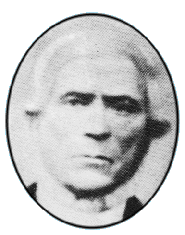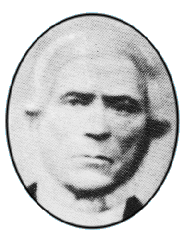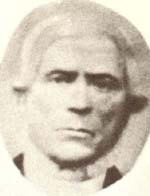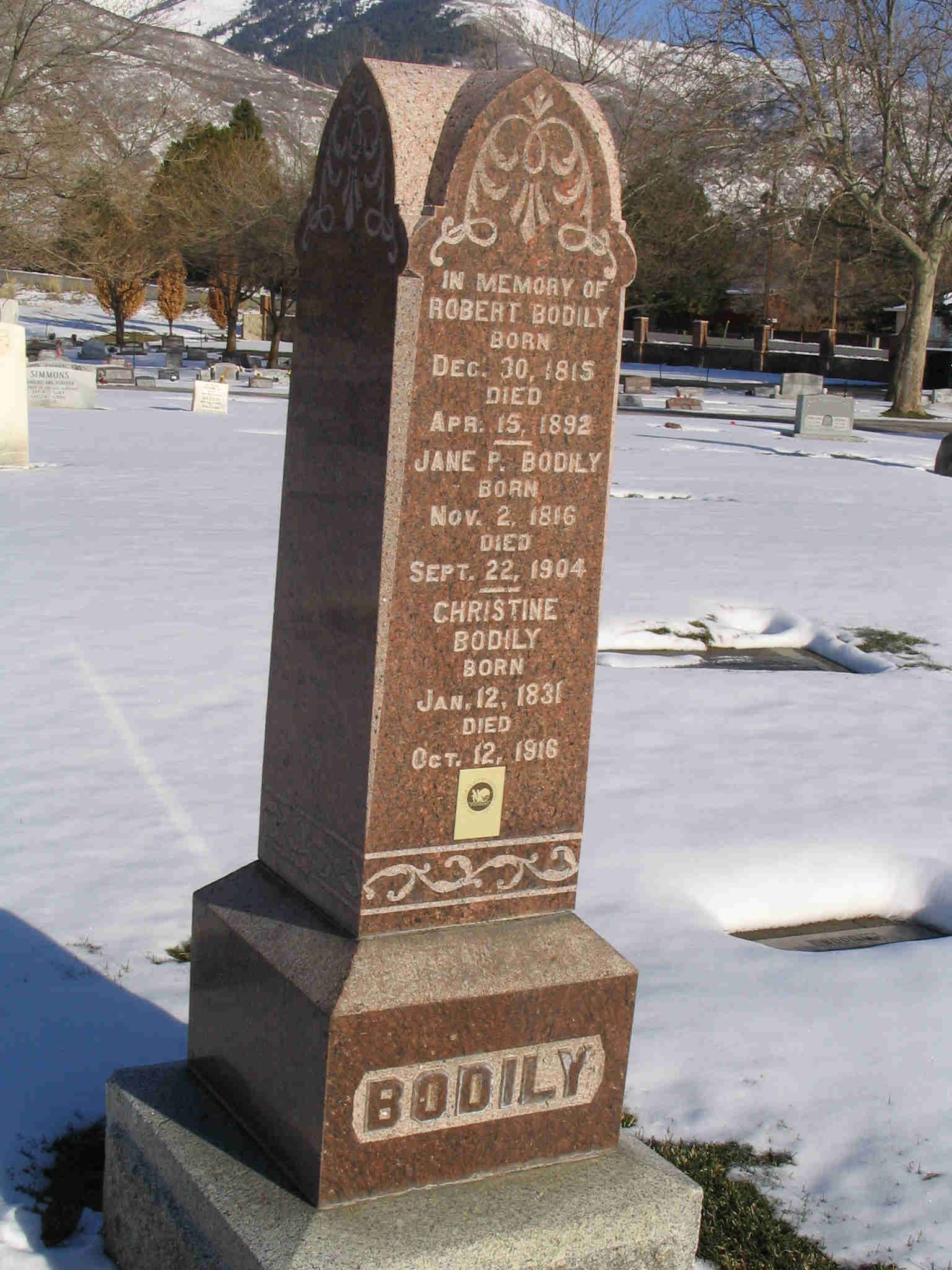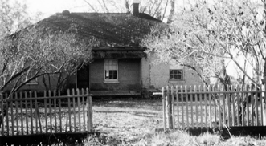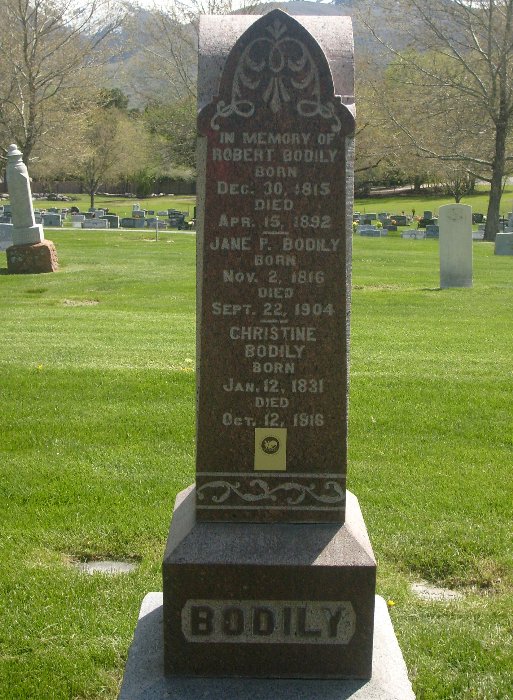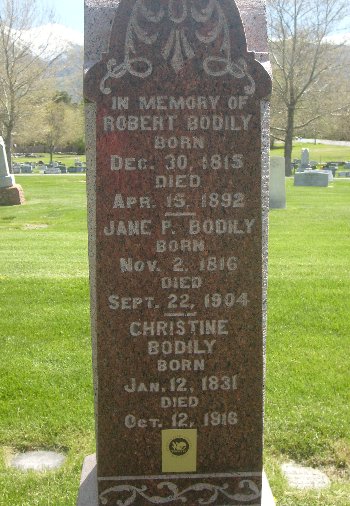Robert Bodily was born 30 Dec 1815 at Blakesley, Northamptonshire, England.
He was a son of Daniel Bodily and Ann Page. Robert was born about the same time the Napoleonic war ended. He married Jane Pittam, December 1941. She was born 2 November 1816 at Blakesley, daughter of Jeremiah Pittam and Ann Bliss.
Robert Bodily belonged to the middle class of England and like most of that group was ambitious to advance his family in society. When Robert and his wife were about thirty years of age, the Kingdom of Great Britain was developing a colony in South Africa. The govenment wanted mechanics and stone masons to fortify the Cape. They were encouraging English tradesmen and skilled artisans to go to the colony and teach their trades to the natives. Robert was a skilled stone mason and wheelwright, with a working knowledge of the blacksmith trade. He saw a chance to better himself by accepting the government's call in South Africa and volunteered for this venture.
During this time some of the African natives belonged to a religious organization that were practicing some extreme forms of worship. They killed off all their livestock, destroyed their homes and assembled themselves on top of Table Mountain to await the coming of the Saviour. (Table Mountain is north of Cape Town and when the winds blew, the clouds settled down on the mountain so it looked like a table cloth spread over a table.) Their fields were neglected, their livestock gone, resulting in severe poverty and starvation. It was into such a colony that Englishmen were asked to go and introduce English civilization to the natives.
Robert Bodily, his wife and their sons, William and Robert, left England about 1845-1846, for the Cape of Good Hope in South Africa. They landed in Cape Town on Easter Sunday in 1846. He acted as an engineer in the Royal Service, helping to complete the fortifications at Cape Town. On the 6th of May1847, their third child, James, was born at the Cape of Good Hope. They lived in Cape Town until about 1848. During this time all the guns in the fort were reset and the buildings strengthened. The town then had a population of about 10,000.
Robert and his family moved from Cape Town to Port Elizabeth. Port Elizabeth was situated in eastern South Africa, at the point of Table Mountain. It had a population of 5,000 to 6,000 people. In Port Elizabeth, he worked at his trade as mason and wheelwright for five years.
They moved from Port Elizabeth to a small place called Dry Fountain and remained there for about six months. Each move he made, he went to a smaller community with less advantage, but with a better chance for one who is interested in the welfare of his family. His wife was willing to go where he went and she encouraged him in his work.
Robert Bodily took a government grant consisting of about 12,000 morgans (a morgan contains about 1-1/4 acres) which required him to maintain a public house for the accommodation of travelers, and also a wagon and blacksmith shop so the traveler could repair their wagons as they traveled through the country. This grant was situated on Bushman's River about midway between Port Elizabeth and Grahamstown, a small town of about 3,000 people.
Bushman's River was a very sparsely settled country with few neighbors. Robert and Jane Bodily were staunch members of the Church of England. Before leaving England, Robert had been a member of the Church Choir. They loved culture and music but like many pioneers that went into rough country they found themselves out in the world far away from their society and Church. They were prayerful people and they taught their children to observe and respect the principles of the Church of England.
In April 1855 a mission of the Church of Jesus Christ of Latter-day Saints was opened up in South Africa. The first Mormon Missionaries sent to Africa were Jesse Haven, and Leornard I. Smith, and William Walker. The missionaries experienced a lot of opposition and some mob violence. But after some time they gained a few converts.
Robert and Jane Bodily became acquainted with a dear friend, John Stock, who lived in Port Elizabeth and who used to make a practice of visiting them about Christmas time every year. He affected their lives more than anyone whom they had ever met. Brother Stock had met the Mormon Elders and had been converted to the Mormon Church. He endeavored to convert Brother and Sister Bodily to his faith, but was unable to do so at this time.
About 1857, the Elders were sent by Brother Stock to Bushman's River to meet Robert Bodily. The Elders stopped over night with the family and they talked until a late hour about the scriptures. Jane Bodily, was a great Bible Student, and produced many scriptures in support of her own faith, but the Elders took the same scriptures and used them in defense of their own cause. The Elders left the next morning on horse back, as that was the way they traveled, and upon their departure Robert Bodily presented them with a purse of money.
He was now considered a rich man, he had accumulated wealth rapidly while he lived at Bushman's River. He had large herds of cattle and many acres of land.
The Elders were gone for abut a month, then returned and stopped again over night with the family. Again, Jane Bodily had lots of scriptures to present to them and they talked until late in the night.
Robert Bodily employed a number of hands; and together with their families they studied and pondered over the instructions of the Elders. The result was that about the latter part of 1857, Robert wrote to his friend, Brother Stocks who was at this time President of the Port Elizabeth Branch, to come up and baptize him along with his wife and their sons, William, Robert and James; as well as some of the work hands. They were baptized by Brother Stocks in the Bushman's River.
Prior to their baptism Robert Bodily was contented to stay in South Africa. Their home was a rallying point for other members of the Church, and many of them enjoyed the hospitality of the Bodily family. But now he felt he must come to Utah. They sold their home, as well as all their holdings for a fair price. In addition to his own family, he sponsored five other families of emigrants. Their names were Sandall's, Talbot's, Wiggle's, Dawson's and Hemcoyhite's. He paid their way and made all the arrangements for their passage.
Robert and his family spent one month in Port Elizabeth before sailing for America. Most of their time was spent fishing. They started for America in a sailing vessel called the Alacrity, under charge of Captain Cooper on 22 March 1860. At this time there were a few saints in Africa, and they gave the passengers who were leaving for America a "farewell." Farewells were not the custom then as they are now.
The company on the ship numbered about forty. They sailed from Port Elizabeth and went by way of Cape Town and St. Helena. They stopped at Cape Town over night and the boys went fishing for sharks. They caught several but the largest was not more than two feet long. There were so many sharks in the bay of Cape Town that it was very unsafe to go in swimming.
On April 12, 1860, they sighted the Isle of Saint Helena and on this date a daughter (Lucy Matilda Bodily), was born to the Bodily family.
On the voyage after St. Helena Island, James got his fishing line and sat on the back of the ship, fishing for a shark that had been following them. One day as he was trying to get a bite, the Captain came out and called, "What ya'doin' here ya' little brat?" James told him and the Captain called the sailors. They got a piece of fat pork and put it on a sharp hook, immediately Mr. Shark grabbed it, and the sailors had a big rope and as they pulled the shark aboard they sang their song "Pull away, pull away." The shark flopped and jerked and kept knocking against the cabin with his tail making it very hard to get him on board - for he was a big fellow, twelve feet long.
The steward on the ship did all the cooking. He cooked such food as we have today: pork & beans, salted and pickled beef, potatoes, vegetables and sea biscuits. The sea biscuits were about 1/2 to 3/4 inck thick and the size of a plate. They are very hard until dunked in milk, coffee or tea; they resemble soda crackers only much larger. They stored them in a barrel until they were at sea. The steward also fried fish for those who caught fish.
James enjoyed himself on the voyage to America by sitting and fishing; one day as he was fishing, Brother William Stokes, who had been a sailor before joining the Church, asked James what he was doing sitting out and alone by the side of the ship. James told him he was trying to catch a fish. Brother Stokes took the line and put a piece of white cloth on the hook where the bait was, he then put it into the water and gave the line a jerk and he had his fish; he soon had eight Dolphins, which are choice fish.
One morning when they awoke, as far as the eye could see, whales bounced and played in the water. The captain said if one hit the ship with its tail he would sink it.
They encountered storms at sea and some were severe. As they neared St. Pete and Paul Rocks in the Atlantic Ocean, they came near running into a large rock hidden under water. They were doing fifteen or twenty knots, the captain saw the rock and went running out shouting, "About ship!" which means to turn the ship about. He later explained that if they had gone on for fifteen minutes longer there would have been a big wreck.
The passengers watched the Paupose, a sea animal which is a good deal like a clumsy pig and the size of a yearling calf. They live in the ocean and swim in droves. They bounce up and down showing nearly their whole body.
The flying fish also flew in droves, like how back birds fly, until their wings get dry - then they would drop into the sea again. Some of them alighted on the ship and Robert Bodily caught and dried two or three of them. He brought them to Utah to show the people.
When they started from Port Elizabeth the sun was in the North. The night they crossed the equator the sailors brought a lot of water and filled some tubs, they had everybody who had not crossed the equator line before, especially the young people, sit on a board which they had put across the tubs. Neptune was supposed to appear to them as they crossed the line equator, then they were introduced into the other part of the world by having the board pulled from under them and being dunked into the water. Some took it as a joke and others got very angry; thereafter the sun was to the South of them. There was a very sick woman on the ship, her name was Sister Sandle. The Captain said the shark that had been following was a sign that she was going to die before they landed, but the fish was caught and she lived. She came to America and to Utah; and some years later died in Kaysville, Utah.
The voyage form Port Elizabeth to Boston, Massachusetts took sixteen weeks. At times they were stalled for days without enough wind to move the vessel. At other times the boat was tossed by storms that threatened to destroy it. At such times the Captain would ask the passengers to pray for divine help.
Word had gone out that a shipload of Africans were going to land in Boston harbor; the impression among the people was that Africans were all colored people. The docks were crowded with people who had come to see the colored people land, but to the surprise of the crowd the Africans were all white and of different nationalities.
Three nationalities are represented in Robert Bodily's family: English, African, and American. Lucy Matilda, the baby born on the ship was declared an American, because she first set foot on American soil. Robert Bodily and his family had a pleasant and enjoyable trip.
From Boston, they went by train to St. Joseph on the Missouri River. This was the first time some of the children had been on a train, and soon after they boarded it two stalwart Indians boarded it also. They were the first Indians the children had ever seen. The little company went from St. Joseph by boat up to Florence, Nebraska, where immigrant trains of ox teams and wagons were being outfitted for the long trek across the county to Utah. Here Robert Bodily stopped and fitted out a wagon to cross the plains. He also fitted out five families to cross the plains and his son James, drove for two old maids.
Robert Bodily was appointed Captain of the African group and a man named Nephi Johnson was in charge of the entire wagon train, with William Budge as Chaplain. (He became the father of the Doctor's Budge of Logan, Utah.)
As the boys had been reared with cattle and understood them, they were given the responsibility of driving two yoke of cattle across the plains and they had an enjoyable time while crossing. Every night the wagons were circled to form a corral, the tongues of the wagons on the inside, and the company always had prayers - night and morning. They travelled in President Budge's company and as they came up the Platte river a party of the Poenuce Indians travelled with them for a week. Robert Bodily had brought forty head of cattle and five horses in Florence, Nebraska. The company killed several cows for the Indians to eat. The Poenuces said they were coming to fight the Crow Indians. The company had no trouble with Indians.
To furnish amusement Robert Bodily put up a stick on the ground 50 or 75 or one hundred paces off from the group, he would put a dime on the stick and whoever shot it off could keep it. The company saw buffaloes, elk, deer, and many other wild game while crossing the plains.
The Bodily children's first experience with snow was the night they camped at Little Mountain, east of Salt Lake City, Utah. They came down out of Emigration Canyon into the valley in Salt Lake on 5 October 1860; they had travelled nearly an entire year.
Throughout the long, arduous voyage and the overland trip by ox team, Brother Bodily showed his generosity on numerous occasions by aiding his poorer brethren. When at Florence, Nebraska he donated two thousand dollars to the emigration fund. At this time the Church was in need of funds to aid in immigration and unless funds could be raised, the immigrants would have to stop in Florence, Nebraska, until spring. Brother Bodily gave the money to George Q. Cannon.
Brother Cannon promised him he would get his money back when they got into the valley, but they didn't have money at the tithing office to pay him and they didn't have flour so he could get his winter supply, so he had to look somewhere else for flour. In the spring he went to see President Brigham Young and made the Church a present of the money. President Young asked him if he gave it with a good feeling, and the reply was that he dared not give it any other way.
President Brigham Young placed his hand on Robert Bodily's shoulder said,"God bless you, Brother Bodily, but you will go down to the bed rocks, but you'll never see the day when you shall have no bread, or your children after you shall have no bread." A few days after this Brother Bodily met Apostle Cannon, who asked him if he had received his money. Brother Bodily told him what he had done and Brother Cannon placed his hand on the same place as President Brigham Young had and said the same words that Brigham Young had said. Robert marveled at them saying the very same thing.
The Bodily family stayed in Salt Lake City through the winter of 1860 - 1861. In June 1861, he sold their home in Salt Lake City because he had a large family and he had a chance to buy a larger place with a farm at a cheap price, in Kaysville, Davis County. Here he resided until his death on 5 April 1892.
His character was beautiful in its rugged simplicity and honesty; stern and uncompromising in the presence of evil. He was always pleasant and congenial in the society of friends. He was a man who to know was a pleasure and to possess his esteem was an honor. One of his characteristics that harmonized with the beauty of his life was his love of flowers. He often said if he could not have a flower garden in heaven he did not care to go there. He had the first real flower garden in Davis County, drawing water from his well to nourish it. He encouraged others to raise flowers by giving them seeds and starts from his own garden to all who were interested. He enjoyed sharing their beauty and fragrance and explaining their features to neighbors and his grandchildren. He also sang and accompanied the choir on his Base Violin for many years.
After joining the Church, Robert Bodily followed almost literally the Saviour's injunction,"Sell all thou has and give to the poor, and follow Me." After he became an old man he met with financial reverses and had to make a new home under conditions of hardship. But he went to work with phenomenal energy. The whole history of his life was one of great labor under conditions which to many others would have been discouraging. But through it all he remained constant. Prosperity could not spoil him and adversity did not change him. He was the father of twelve children, all honorable men and women.
--------------
Port Elizabeth to Boston 5 Apr 1860 - 18 Jun 1860
Ship Name
Alacrity
Vessel Type
Bark
Departure
5 Apr 1860 from Port Elizabeth
Arrival
18 Jun 1860 at Boston
Source
Customs # missing (FHL #419,950); Evan P. Wright, A History of the South
African Mission, pp. 272-273 (FHL #1,059,491 item 8); Journal of Robert Bodily,
pp.6-9,11 (source abbreviations)
Notes
Little is known of this voyage.
Passengers (114)
Bodily, Edwin
Bodily, Emma Sarah
Bodily, James
Bodily, Jane Elizabeth
Bodily, Jane Pittman
Bodily, Joseph
Bodily, Lucy Matilda
Bodily, Mary Ann
Bodily, Robert
Bodily, Robert, Jr.
Bodily, William
mormonmigration.lib.byu.edu/
Ship info provided by David Metcalf
Robert Bodily was born 30 Dec 1815 at Blakesley, Northamptonshire, England.
He was a son of Daniel Bodily and Ann Page. Robert was born about the same time the Napoleonic war ended. He married Jane Pittam, December 1941. She was born 2 November 1816 at Blakesley, daughter of Jeremiah Pittam and Ann Bliss.
Robert Bodily belonged to the middle class of England and like most of that group was ambitious to advance his family in society. When Robert and his wife were about thirty years of age, the Kingdom of Great Britain was developing a colony in South Africa. The govenment wanted mechanics and stone masons to fortify the Cape. They were encouraging English tradesmen and skilled artisans to go to the colony and teach their trades to the natives. Robert was a skilled stone mason and wheelwright, with a working knowledge of the blacksmith trade. He saw a chance to better himself by accepting the government's call in South Africa and volunteered for this venture.
During this time some of the African natives belonged to a religious organization that were practicing some extreme forms of worship. They killed off all their livestock, destroyed their homes and assembled themselves on top of Table Mountain to await the coming of the Saviour. (Table Mountain is north of Cape Town and when the winds blew, the clouds settled down on the mountain so it looked like a table cloth spread over a table.) Their fields were neglected, their livestock gone, resulting in severe poverty and starvation. It was into such a colony that Englishmen were asked to go and introduce English civilization to the natives.
Robert Bodily, his wife and their sons, William and Robert, left England about 1845-1846, for the Cape of Good Hope in South Africa. They landed in Cape Town on Easter Sunday in 1846. He acted as an engineer in the Royal Service, helping to complete the fortifications at Cape Town. On the 6th of May1847, their third child, James, was born at the Cape of Good Hope. They lived in Cape Town until about 1848. During this time all the guns in the fort were reset and the buildings strengthened. The town then had a population of about 10,000.
Robert and his family moved from Cape Town to Port Elizabeth. Port Elizabeth was situated in eastern South Africa, at the point of Table Mountain. It had a population of 5,000 to 6,000 people. In Port Elizabeth, he worked at his trade as mason and wheelwright for five years.
They moved from Port Elizabeth to a small place called Dry Fountain and remained there for about six months. Each move he made, he went to a smaller community with less advantage, but with a better chance for one who is interested in the welfare of his family. His wife was willing to go where he went and she encouraged him in his work.
Robert Bodily took a government grant consisting of about 12,000 morgans (a morgan contains about 1-1/4 acres) which required him to maintain a public house for the accommodation of travelers, and also a wagon and blacksmith shop so the traveler could repair their wagons as they traveled through the country. This grant was situated on Bushman's River about midway between Port Elizabeth and Grahamstown, a small town of about 3,000 people.
Bushman's River was a very sparsely settled country with few neighbors. Robert and Jane Bodily were staunch members of the Church of England. Before leaving England, Robert had been a member of the Church Choir. They loved culture and music but like many pioneers that went into rough country they found themselves out in the world far away from their society and Church. They were prayerful people and they taught their children to observe and respect the principles of the Church of England.
In April 1855 a mission of the Church of Jesus Christ of Latter-day Saints was opened up in South Africa. The first Mormon Missionaries sent to Africa were Jesse Haven, and Leornard I. Smith, and William Walker. The missionaries experienced a lot of opposition and some mob violence. But after some time they gained a few converts.
Robert and Jane Bodily became acquainted with a dear friend, John Stock, who lived in Port Elizabeth and who used to make a practice of visiting them about Christmas time every year. He affected their lives more than anyone whom they had ever met. Brother Stock had met the Mormon Elders and had been converted to the Mormon Church. He endeavored to convert Brother and Sister Bodily to his faith, but was unable to do so at this time.
About 1857, the Elders were sent by Brother Stock to Bushman's River to meet Robert Bodily. The Elders stopped over night with the family and they talked until a late hour about the scriptures. Jane Bodily, was a great Bible Student, and produced many scriptures in support of her own faith, but the Elders took the same scriptures and used them in defense of their own cause. The Elders left the next morning on horse back, as that was the way they traveled, and upon their departure Robert Bodily presented them with a purse of money.
He was now considered a rich man, he had accumulated wealth rapidly while he lived at Bushman's River. He had large herds of cattle and many acres of land.
The Elders were gone for abut a month, then returned and stopped again over night with the family. Again, Jane Bodily had lots of scriptures to present to them and they talked until late in the night.
Robert Bodily employed a number of hands; and together with their families they studied and pondered over the instructions of the Elders. The result was that about the latter part of 1857, Robert wrote to his friend, Brother Stocks who was at this time President of the Port Elizabeth Branch, to come up and baptize him along with his wife and their sons, William, Robert and James; as well as some of the work hands. They were baptized by Brother Stocks in the Bushman's River.
Prior to their baptism Robert Bodily was contented to stay in South Africa. Their home was a rallying point for other members of the Church, and many of them enjoyed the hospitality of the Bodily family. But now he felt he must come to Utah. They sold their home, as well as all their holdings for a fair price. In addition to his own family, he sponsored five other families of emigrants. Their names were Sandall's, Talbot's, Wiggle's, Dawson's and Hemcoyhite's. He paid their way and made all the arrangements for their passage.
Robert and his family spent one month in Port Elizabeth before sailing for America. Most of their time was spent fishing. They started for America in a sailing vessel called the Alacrity, under charge of Captain Cooper on 22 March 1860. At this time there were a few saints in Africa, and they gave the passengers who were leaving for America a "farewell." Farewells were not the custom then as they are now.
The company on the ship numbered about forty. They sailed from Port Elizabeth and went by way of Cape Town and St. Helena. They stopped at Cape Town over night and the boys went fishing for sharks. They caught several but the largest was not more than two feet long. There were so many sharks in the bay of Cape Town that it was very unsafe to go in swimming.
On April 12, 1860, they sighted the Isle of Saint Helena and on this date a daughter (Lucy Matilda Bodily), was born to the Bodily family.
On the voyage after St. Helena Island, James got his fishing line and sat on the back of the ship, fishing for a shark that had been following them. One day as he was trying to get a bite, the Captain came out and called, "What ya'doin' here ya' little brat?" James told him and the Captain called the sailors. They got a piece of fat pork and put it on a sharp hook, immediately Mr. Shark grabbed it, and the sailors had a big rope and as they pulled the shark aboard they sang their song "Pull away, pull away." The shark flopped and jerked and kept knocking against the cabin with his tail making it very hard to get him on board - for he was a big fellow, twelve feet long.
The steward on the ship did all the cooking. He cooked such food as we have today: pork & beans, salted and pickled beef, potatoes, vegetables and sea biscuits. The sea biscuits were about 1/2 to 3/4 inck thick and the size of a plate. They are very hard until dunked in milk, coffee or tea; they resemble soda crackers only much larger. They stored them in a barrel until they were at sea. The steward also fried fish for those who caught fish.
James enjoyed himself on the voyage to America by sitting and fishing; one day as he was fishing, Brother William Stokes, who had been a sailor before joining the Church, asked James what he was doing sitting out and alone by the side of the ship. James told him he was trying to catch a fish. Brother Stokes took the line and put a piece of white cloth on the hook where the bait was, he then put it into the water and gave the line a jerk and he had his fish; he soon had eight Dolphins, which are choice fish.
One morning when they awoke, as far as the eye could see, whales bounced and played in the water. The captain said if one hit the ship with its tail he would sink it.
They encountered storms at sea and some were severe. As they neared St. Pete and Paul Rocks in the Atlantic Ocean, they came near running into a large rock hidden under water. They were doing fifteen or twenty knots, the captain saw the rock and went running out shouting, "About ship!" which means to turn the ship about. He later explained that if they had gone on for fifteen minutes longer there would have been a big wreck.
The passengers watched the Paupose, a sea animal which is a good deal like a clumsy pig and the size of a yearling calf. They live in the ocean and swim in droves. They bounce up and down showing nearly their whole body.
The flying fish also flew in droves, like how back birds fly, until their wings get dry - then they would drop into the sea again. Some of them alighted on the ship and Robert Bodily caught and dried two or three of them. He brought them to Utah to show the people.
When they started from Port Elizabeth the sun was in the North. The night they crossed the equator the sailors brought a lot of water and filled some tubs, they had everybody who had not crossed the equator line before, especially the young people, sit on a board which they had put across the tubs. Neptune was supposed to appear to them as they crossed the line equator, then they were introduced into the other part of the world by having the board pulled from under them and being dunked into the water. Some took it as a joke and others got very angry; thereafter the sun was to the South of them. There was a very sick woman on the ship, her name was Sister Sandle. The Captain said the shark that had been following was a sign that she was going to die before they landed, but the fish was caught and she lived. She came to America and to Utah; and some years later died in Kaysville, Utah.
The voyage form Port Elizabeth to Boston, Massachusetts took sixteen weeks. At times they were stalled for days without enough wind to move the vessel. At other times the boat was tossed by storms that threatened to destroy it. At such times the Captain would ask the passengers to pray for divine help.
Word had gone out that a shipload of Africans were going to land in Boston harbor; the impression among the people was that Africans were all colored people. The docks were crowded with people who had come to see the colored people land, but to the surprise of the crowd the Africans were all white and of different nationalities.
Three nationalities are represented in Robert Bodily's family: English, African, and American. Lucy Matilda, the baby born on the ship was declared an American, because she first set foot on American soil. Robert Bodily and his family had a pleasant and enjoyable trip.
From Boston, they went by train to St. Joseph on the Missouri River. This was the first time some of the children had been on a train, and soon after they boarded it two stalwart Indians boarded it also. They were the first Indians the children had ever seen. The little company went from St. Joseph by boat up to Florence, Nebraska, where immigrant trains of ox teams and wagons were being outfitted for the long trek across the county to Utah. Here Robert Bodily stopped and fitted out a wagon to cross the plains. He also fitted out five families to cross the plains and his son James, drove for two old maids.
Robert Bodily was appointed Captain of the African group and a man named Nephi Johnson was in charge of the entire wagon train, with William Budge as Chaplain. (He became the father of the Doctor's Budge of Logan, Utah.)
As the boys had been reared with cattle and understood them, they were given the responsibility of driving two yoke of cattle across the plains and they had an enjoyable time while crossing. Every night the wagons were circled to form a corral, the tongues of the wagons on the inside, and the company always had prayers - night and morning. They travelled in President Budge's company and as they came up the Platte river a party of the Poenuce Indians travelled with them for a week. Robert Bodily had brought forty head of cattle and five horses in Florence, Nebraska. The company killed several cows for the Indians to eat. The Poenuces said they were coming to fight the Crow Indians. The company had no trouble with Indians.
To furnish amusement Robert Bodily put up a stick on the ground 50 or 75 or one hundred paces off from the group, he would put a dime on the stick and whoever shot it off could keep it. The company saw buffaloes, elk, deer, and many other wild game while crossing the plains.
The Bodily children's first experience with snow was the night they camped at Little Mountain, east of Salt Lake City, Utah. They came down out of Emigration Canyon into the valley in Salt Lake on 5 October 1860; they had travelled nearly an entire year.
Throughout the long, arduous voyage and the overland trip by ox team, Brother Bodily showed his generosity on numerous occasions by aiding his poorer brethren. When at Florence, Nebraska he donated two thousand dollars to the emigration fund. At this time the Church was in need of funds to aid in immigration and unless funds could be raised, the immigrants would have to stop in Florence, Nebraska, until spring. Brother Bodily gave the money to George Q. Cannon.
Brother Cannon promised him he would get his money back when they got into the valley, but they didn't have money at the tithing office to pay him and they didn't have flour so he could get his winter supply, so he had to look somewhere else for flour. In the spring he went to see President Brigham Young and made the Church a present of the money. President Young asked him if he gave it with a good feeling, and the reply was that he dared not give it any other way.
President Brigham Young placed his hand on Robert Bodily's shoulder said,"God bless you, Brother Bodily, but you will go down to the bed rocks, but you'll never see the day when you shall have no bread, or your children after you shall have no bread." A few days after this Brother Bodily met Apostle Cannon, who asked him if he had received his money. Brother Bodily told him what he had done and Brother Cannon placed his hand on the same place as President Brigham Young had and said the same words that Brigham Young had said. Robert marveled at them saying the very same thing.
The Bodily family stayed in Salt Lake City through the winter of 1860 - 1861. In June 1861, he sold their home in Salt Lake City because he had a large family and he had a chance to buy a larger place with a farm at a cheap price, in Kaysville, Davis County. Here he resided until his death on 5 April 1892.
His character was beautiful in its rugged simplicity and honesty; stern and uncompromising in the presence of evil. He was always pleasant and congenial in the society of friends. He was a man who to know was a pleasure and to possess his esteem was an honor. One of his characteristics that harmonized with the beauty of his life was his love of flowers. He often said if he could not have a flower garden in heaven he did not care to go there. He had the first real flower garden in Davis County, drawing water from his well to nourish it. He encouraged others to raise flowers by giving them seeds and starts from his own garden to all who were interested. He enjoyed sharing their beauty and fragrance and explaining their features to neighbors and his grandchildren. He also sang and accompanied the choir on his Base Violin for many years.
After joining the Church, Robert Bodily followed almost literally the Saviour's injunction,"Sell all thou has and give to the poor, and follow Me." After he became an old man he met with financial reverses and had to make a new home under conditions of hardship. But he went to work with phenomenal energy. The whole history of his life was one of great labor under conditions which to many others would have been discouraging. But through it all he remained constant. Prosperity could not spoil him and adversity did not change him. He was the father of twelve children, all honorable men and women.
--------------
Port Elizabeth to Boston 5 Apr 1860 - 18 Jun 1860
Ship Name
Alacrity
Vessel Type
Bark
Departure
5 Apr 1860 from Port Elizabeth
Arrival
18 Jun 1860 at Boston
Source
Customs # missing (FHL #419,950); Evan P. Wright, A History of the South
African Mission, pp. 272-273 (FHL #1,059,491 item 8); Journal of Robert Bodily,
pp.6-9,11 (source abbreviations)
Notes
Little is known of this voyage.
Passengers (114)
Bodily, Edwin
Bodily, Emma Sarah
Bodily, James
Bodily, Jane Elizabeth
Bodily, Jane Pittman
Bodily, Joseph
Bodily, Lucy Matilda
Bodily, Mary Ann
Bodily, Robert
Bodily, Robert, Jr.
Bodily, William
mormonmigration.lib.byu.edu/
Ship info provided by David Metcalf
Family Members
-
![]()
William Bodily
1842–1927
-
![]()
Robert Bodily Jr
1844–1942
-
![]()
James Bodily
1847–1931
-
![]()
Mary Ann Bodily
1849–1862
-
![]()
Edwin Bodily
1851–1923
-
![]()
Joseph Bodily
1853–1926
-
![]()
Jane Elizabeth Bodily Layton
1855–1930
-
![]()
Emma S Bodily Galbraith
1858–1935
-
![]()
Lucy Matilda Bodily
1860–1870
-
![]()
Ann Elizabeth Bodily Galbraith
1866–1904
-
![]()
Daniel Bodily
1868–1920
-
![]()
Phineas Bodily
1870–1962
-
![]()
Mary Eleanor Bodily Linford
1873–1960
Advertisement
Explore more
Sponsored by Ancestry
Advertisement
